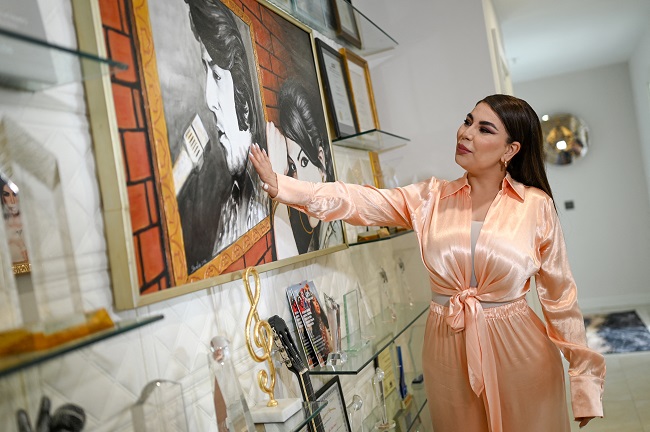When a Taliban militant meets Afghan pop star Ayrana Sayeed, he tries to charm her
“If you marry me, I will have a beard and a moustache and tanks. And I will build you a nightclub!” The scene, completely unimaginable in real life with the singer now based in exile after fleeing in the wake of the Taliban’s takeover, is part of a satirical YouTube animation series that has captivated Afghans in recent weeks.
It shows Sayeed appearing to the militant in his dreams. But then the man, sleeping with his Kalashnikov slung around his shoulder, wakes up to reality to find he is in fact hugging a bearded fellow militant.
The militant is then shown in another video proudly showing off how life has changed in Kabul since the Islamist fundamentalists took control in mid-August.
He comes upon a woman wearing an Arab-style niqab face veil.
“Are you a genie, a fairy or a human?” he inquires, reflecting the confusion of locals when faced with such garb, now being promoted by the Taliban.
Producing such work could be lethal in Afghanistan under the Taliban, where many artists are in hiding and even ordinary people have erased potentially compromising material from their phones.
The author of the videos is Afghan refugee Hafiz Afzali, 34, who has lived in Finland for the past seven years.
He left Afghanistan in 2000 during the first phase of Taliban rule ended by the 2001 US-led invasion.
He ended up in Finland via a long, clandestine route to Europe and puts together his videos on YouTube during the week, while working as a taxi driver at the weekend.
“I left Afghanistan at the age of 13, when the Taliban was in power. I remember everything,” said Afzali, who came to Finland after living for three years in Iran, one year in Turkey and seven in Greece.
‘Empty Hearts’
Afzali is a self-taught expert in 3D design and is perfecting his skills at a Helsinki university.
This has allowed him to create more than 200 comic videos that started out by targeting the deposed pro-Western Afghan government, which critics accused of being riddled by corruption.
But now his sights are set on the Taliban.
“Their guns may be full of bullets but their hearts are empty,” he told AFP.
Several of his works have enjoyed more than 1.7 million views.
“It works very well. People get the message because it’s visual,” Hafzali said.
“I want to send my message to Taliban leaders and Taliban followers that we are free human beings, we’re not going to accept this rule. I think the majority of people don’t want to accept this.”
His attitude is shared by Musa Zafar, a prominent Afghan satirist. Zafar fled the country in 2016 but refuses to disclose where he is living now for security reasons.
“Satirists make people laugh, while being informative like media,” of which Afghans are “tired” because their usual flow of information is “depressing”, he said.
‘Narrow-Mindedness’
Satire can also make the political figures targeted “think twice” about the way they govern and the measures they take, said Zafar, who posts his work under the name “Imam Musa”.
One of his jokes recently posted on Afghanistan International, a widely read news site for Afghans, referenced vegetables to poke fun at the Taliban.
“A new committee has been formed within the Ministry for the Promotion of Virtue and the Prevention of Vice to discuss the shape of cucumbers, eggplants and pumpkins” — in case they resemble sexual organs.
For the same reasons, “bakers now have two weeks to produce bread that is neither round nor long,” he continued.
His post echoed the televised statements of a pro-Taliban cleric who at the end of September advised women “not to put on perfume when they leave their homes”, nor to wear shoes with heels or click them on the ground lest they arouse men.
“The ignorance and narrow-mindedness of the Taliban energises satirists,” said Imam Musa.
In contrast to colleagues living in exile abroad, the artist Mergan Punch — a pseudonym — has decided to continue living in Kabul where he works in hiding.
He opened an account on social media where his drawings are published, including an image of a Taliban leaning on a mallet which he has used to kill two doves, the symbol of peace.
“They have not changed. They want to put their mullahs in power and make Afghanistan the country of terrorists”, he said.
Back in the relative safety of Finland, Afzali said he “cannot believe” his country has “gone a century back” with the Taliban’s reconquest of Afghanistan.
“I know it’s really difficult to live under the Taliban. Because I have seen it and I used to live under it.
“I’m really sorry for those who are there.”
AFP



